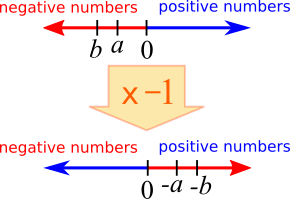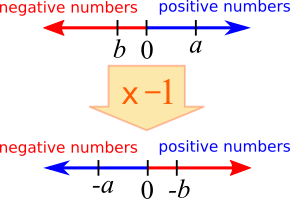Or search by topic
Number and algebra
Geometry and measure
Probability and statistics
Working mathematically
Advanced mathematics
For younger learners
Inequalities



- Problem
- Student Solutions
Yazan from Dubai International Academy in the United Arab Emirates explained statement 1 must be true, assuming $a$ and $b$ are positive:
Statement 1 ($-b \ge -a$) is correct because $a$ has a higher value than $b$, so if you put a negative sign before both of them, $-b$ will be higher, because the higher the value of the number after the negative sign, the lower it is. Suspect a is $14$ and b is $10.$ If you compare $-14$ and $-10,$ the statement goes like this: $-14 \lt -10.$
Here is a diagram showing why the statement must also be true if $a$ and $b$ are both negative.

Here is a diagram showing why the statement must be true if $a$ is positive but $b$ is negative.

Terry and Miguel from International School of Krakow in Poland used a rule that comes from this idea. Terry wrote:
If you multiply or divide by a negative number, the direction of the inequality sign changes.
Yazan used an example to explain why statement 2 must be true:
Statement 2 ($a^2 + b^2 \ge 2ab$) is [correct] because two numbers squared can’t be [less than] the [product of] numbers by $2.$ Suppose $a$ is $7$ and $b$ is $3.$ $7^2$ is $49$ and $3^2$ squared is $9.$
$49+9=58,$ and $7\times3=21$ and $21x2=20,$ therefore, Statement 2 is [correct].
Terry and Miguel used algebra to show that statement 2 must always be true. This is Terry's work:
For the second argument, I began adding $-2ab$ to both sides, which made it $a^2-2ab+b^2\ge0.$ Knowing that $a^2-2ab+b^2$ can be expressed simply as $(a-b)^2,$ I changed the [inequality] into $(a-b)^2\ge0.$ The second argument is correct.
Naima from Bexley Grammar School and Vivek from Wilsons' School, both in the UK, gave examples to show that statement 3 is not necessarily true. Naima wrote:
We cannot say that statement 3 must be true. It will hold true if $c$ is positive - for example, if $a=4,b=2$ and $c=6,24\ge12.$
But if $c$ is negative, much like in statement 1 this will be reversed: if instead $c=-6,$ the expression will claim that $ac\ge bc,$ or $-24\ge-12,$ which is of course incorrect. So this statement will not be unconditionally true, despite $a$ being larger than $b.$
A single example is enough to show that a statement is not always true, so Naima and Vivek's examples are enough to show that it is definitely not true that statement 3 must be true. Miguel and Terry explained the same idea more generally. Miguel wrote:
Statement 3 is not always true as $c$ can be a negative number and therefore $bc$ would be greater than $ac.$
The Test of Mathematics for University Admission (or TMUA) is designed to give you the opportunity to demonstrate that you have the essential mathematical thinking and reasoning skills needed for a demanding undergraduate Mathematics or Mathematics-related course. There are several UK universities which encourage their applicants to sit TMUA, and a good performance may result in a reduced offer.
For more information about TMUA visit www.admissionstesting.org.

